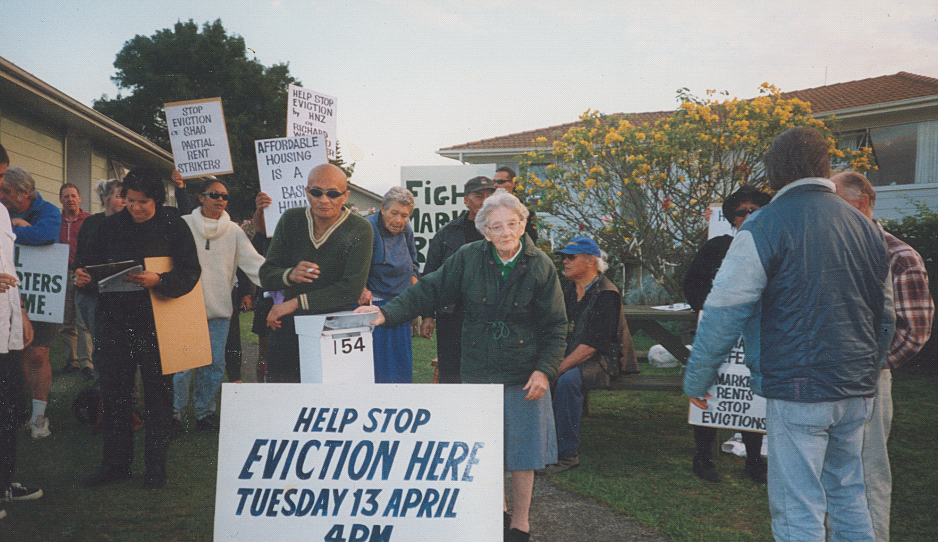The Housing War Is A Class War
Why the war for Auckland is rooted in historical violence, not generational angst.
There is a war going on in Auckland over housing, and it's a class war, rooted in the violence of the colonial capitalism that this city was built on, write Ella Grace McPherson-Newton and Vanessa Cole
Last year, a protest led by students from Waikato's Otorohanga College marched to parliament to petition for Aotearoa's Land Wars to be recognised in a national day of remembrance. The petitioners were greeted by a very small number of supporting politicians on the steps of the beehive. As is often the case with anything that hints at recognising the violent history underpinning the colonisation of this country, the majority of Members of Parliament, and Pākehā, lowered their heads and walked swiftly past.
The continued Pākehā rejection of acknowledging those who died during the theft of Māori lands sits uneasily alongside the willingness to honour those who went to international imperialist wars. A similar tension comes to mind lately, amid the rhetoric of the Auckland housing crisis. Whose voices count? Whose narratives are told? One of intergenerational theft, with a dose of xenophobic tough talk surrounding ‘international buyers’ is amplified by the mainstream media, bloggers, and disgruntled Facebookers around Auckland city. But the actual foundation of the city - the ongoing process of colonisation, and the maintenance of a capitalist economic system that fundamentally cannot house everyone - manages to fall by the wayside.
The erasure of history in the interest of Pākehā comfort, as illustrated in the refusal to acknowledge the Land Wars, rears its head again each time there’s another round of reform, consultation, or debate about Auckland land, who owns it, and who gets to live on it. The latest assault comes in the Auckland Unitary Plan and its accompanying debate. Last week, Mihingarangi Forbes reported for Radio New Zealand on the deletion of tino rangatiratanga and Treaty principles from the plan, removing any process for acknowledging and protecting Māori sites of significance and Mana Whenua involvement in ‘development’ processes. Make no mistake - the removal of what few Māori rights were left within the plan is an attack, yet another offensive in an inherited 200-year war that transcends any particular generation.
As it stands, the Auckland Unitary Plan debate appears to have two main protagonists – on one hand, the NIMBY homeowners who live in wealthy neighbourhoods and do not want to ruin the “character” of their middle-class sanctuaries; on the other, young people shut out of the housing market and forced to pay rent to parasitic landlords. The debate is presented as one between baby-boomers and millenials - the New Zealand Experiment of (neo)liberal reforms that began in the 1980s eventually facilitated massive expansion of private wealth in land ownership and a relentless rise in renting costs, in turn impacting the ability for our generation to access the housing market. Different news outlets take different sides over this framing - most prominently The Spinoff, who recently proclaimed 'the War for Auckland'. Pitched between the twenty-somethings of Generation Zero and the North Shore landowners of Auckland 2040, the Spinoff has placed itself squarely on the side of ‘youth.’
What this form of the debate silences, however, are the voices of those most impacted by the housing crisis. Worse, the way many commentators keep talking about this further reinforces the economic logic at the root of the problem it wants to solve. Try telling the elderly kuia being evicted from their state homes in Glen Innes, a place architect and artist John Haydn called a war zone, or the grandparents and great-grandparents having their pensioner flats privatised, that this is a generational debate. The difference between those who can and cannot buy a house in Auckland is not generational and never has been. It is based on systems of privilege that are rooted in historical trends.
Undoubtedly, policy decisions made over the past 40 years have compromised the opportunities of younger generations, denied access to the state services and secure, well-remunerated employment once on offer while property investment was made ever more lucrative. But the erosion of this safety net under neo-liberalism is precisely what makes this a class issue and not a generational one. It is not the age of the politicians, but their class allegiances and interests that have produced unprecedented inequality in New Zealand. Houses should be affordable. But this generational disparity in opportunities does not, and will never, compare to the disparities of class, which are entrenched in racism and ongoing colonisation. The war for the right to housing isn’t new, it’s just new for a middle class who bought land as a rite of passage until recently.
The voices being completely excluded from this debate explicitly by the architects of the Unitary Plan (and implicitly, by the way the Plan is being covered) are the unemployed and working class, who often do not have the resources to lobby council and businesses to provide a counter-discourse to the debate. Even despite the lack of access and exposure, these groups have long been actively resisting the enclosure and destruction of their communities.
Those communities are most likely to be impacted by intensified housing in the city - it’s a lot easier to sell land with state or council housing on it for new developments than it is to build around private housing. Those that live in wealthy suburbs were always going to have the resources to win a debate against building more houses in their backyards. The real problem of increased density and mixed-housing zoning is the impact it will have on poorer suburbs who face the real possibility of displacement, gentrification, and a city that will no longer shelter them at all.
Auckland is facing a housing crisis, and there is a need to build more, and build soon. However, merely increasing housing supply through private developers is not going to create affordable housing for the unemployed, underemployed, working-class, or even middle-class young people looking to buy their first home. The constant reference to supply and demand completely oversimplifies the way in which capital operates, and assumes that the allocation of supply will at no point involve further land banking and speculation. Nor do the solutions recognise that the most urgent demand lies with those that do not have access to housing at all right now - rental, transitional or otherwise.
What's being overlooked is not the problem of supply, but of distribution. Census data in 2013 noted that there were 33,000 empty homes in Auckland, yet at the same time, homelessness in this city has increased significantly. Short-term economic logic places the wealth of developers and landowners above the immediate needs of those on the streets and assumes the two will somehow synchronise. They won't - there is an enduring shortage in appropriately-located and affordable housing which could only begin to be alleviated within our current economic system with an intensified rollout of state housing. This would benefit all generations. The Government, however, has chosen the crisis as an ideal time not just to privatise public housing, but to sell public land earmarked for affordable housing to developers. significantly below its market value.
Beyond the step backwards in Māori representation, the Independent Hearing Panel removed the requirements of developers to build 10% affordable housing in new developments under the Unitary Plan (the decision, and the reasons behind it, can be found at 6.2.6 of its recommendations). While an inclusionary zoning policy, where developers are required to build some affordable housing, would have done little to increase affordability (as Samuel Stein explains for Jacobin, developers profit immensely while housing is never built in sufficient quantity or priced appropriately), this removal is still a clear indication of whose interests the Unitary Plan serves.
Tāmaki, an area which was predominantly the product of ambitious state housing builds in the 1950s and 1960s, now acts as an experiment for the policies that the Unitary Plan are purporting around land supply and density. In particular, Glen Innes, a state housing community of about 1,500 state houses, served as a pre-Plan trial run for the logic of freeing up land supply, increasing density, and implementing inclusionary zoning policies. The redevelopment entailed the demolition of state housing and the eviction of tenants; subsequently, median house prices in Glen Innes have increased from $400,000 in 2011 to over $900,000 in 2016, in part due to land banking by private developers. This is not affordable by any stretch of the Unitary Plan's limited imagination, particularly to those who were forced out of their homes and community.
If we really want a livable city, it cannot be built solely by private developers and cater solely to the interests of the middle-class. What the debate excludes is the ongoing history of accumulation by dispossession which both causes, and is used as a solution, to the housing crisis.
The real war for Tāmaki Makaurau began with land confiscation and forced sale in the 1800s, and the displacement of Māori from their land, embedding a class system of exploitation by employers and landlords. These processes of displacement continue today in the forced displacement of people from their communities and the ongoing enclosure of land.
In comparison, the furore raised by Generation Zero and their opponents risks reduces housing access to an issue of disgruntled and entitled millenials who want to buy. It further silences Māori, the urban working class, the unemployed, the homeless, and the thousands of families that, for generations, have not had access to secure and affordable housing in the city. Their war isn’t new, it has just been ignored - but its terms have not changed. It is about the need to redistribute resources, about resisting the marginalisation of history, communities, and people. It is time to talk about a war for the city that is worth fighting.
Header image: Anti-eviction protest, 1993. From the archives of Len Parker

